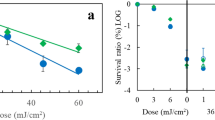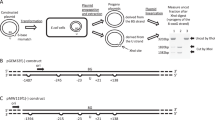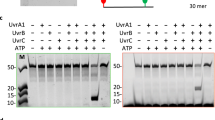Abstract
FREESE has shown in a series of papers1–3 that most mutants induced by 5-bromouracil or 5-bromodeoxy-uridine in bacteriophage T4 can be induced to back-mutate by these same base analogues. This important observation led him to propose as one type of mutation the substitution of a G-C pair in the DNA for an A-T pair by a mechanism that necessarily could work in reverse. We have carried out similar experiments in the course of a study of the mutagenic action of nucleotide base analogues in Salmonella typhimurium and the results are somewhat different from those obtained with the bacteriophage.
This is a preview of subscription content, access via your institution
Access options
Subscribe to this journal
Receive 51 print issues and online access
$199.00 per year
only $3.90 per issue
Buy this article
- Purchase on Springer Link
- Instant access to full article PDF
Prices may be subject to local taxes which are calculated during checkout
Similar content being viewed by others
References
Benzer, S., and Freese, E., Proc. U.S. Nat. Acad. Sci., 44, 112 (1958).
Freese, E., J. Mol. Biol., 1, 87 (1959).
Freese, E., Proc. U.S. Nat. Acad. Sci., 45, 622 (1959).
Lederberg, J., and Zinder, N., J. Amer. Chem. Soc., 70, 4267 (1948).
Author information
Authors and Affiliations
Rights and permissions
About this article
Cite this article
DAWSON, G., McMAHON, P. Mutants of Salmonella typhimurium induced by 5-Bromodeoxyuridine. Nature 204, 1226–1227 (1964). https://doi.org/10.1038/2041226a0
Published:
Issue Date:
DOI: https://doi.org/10.1038/2041226a0
Comments
By submitting a comment you agree to abide by our Terms and Community Guidelines. If you find something abusive or that does not comply with our terms or guidelines please flag it as inappropriate.



